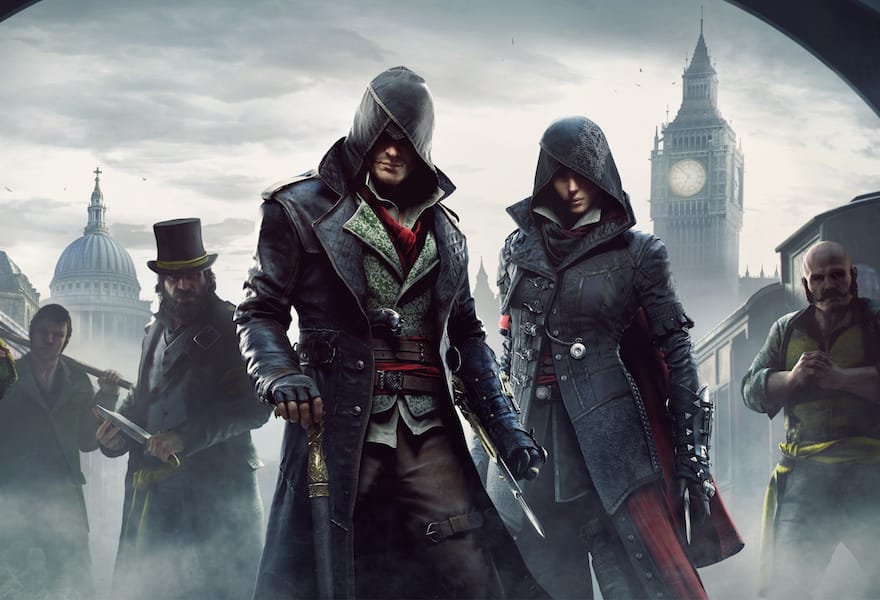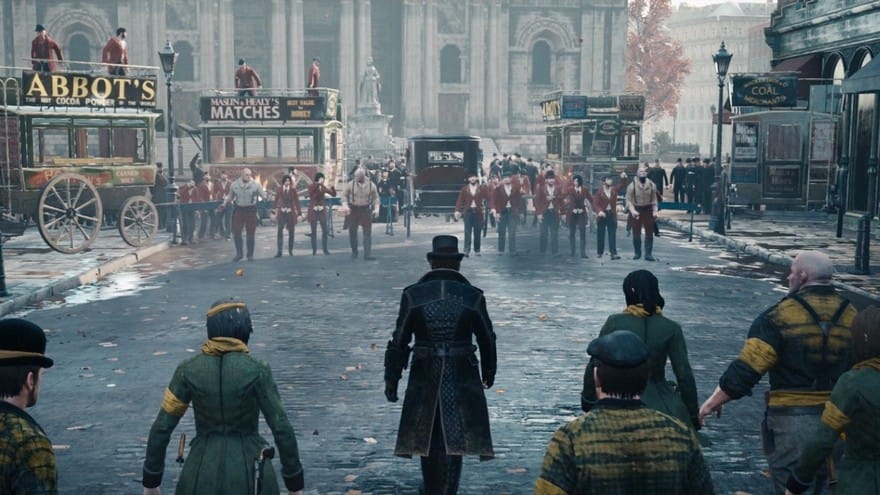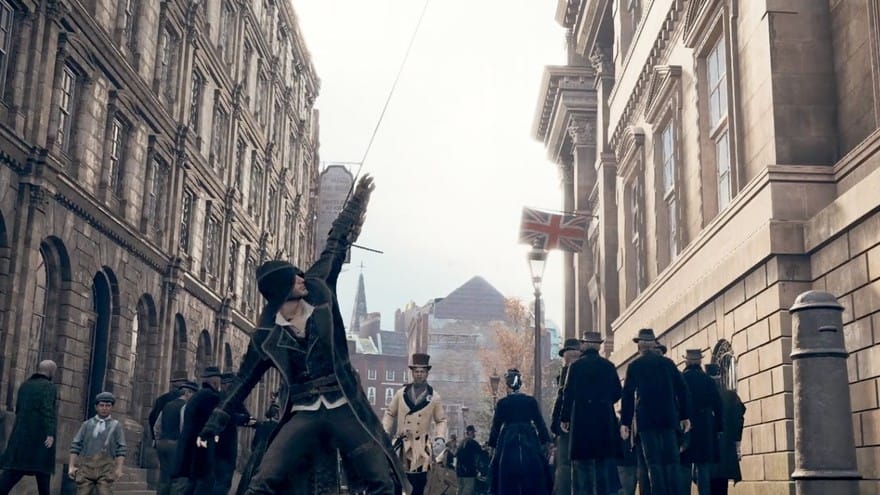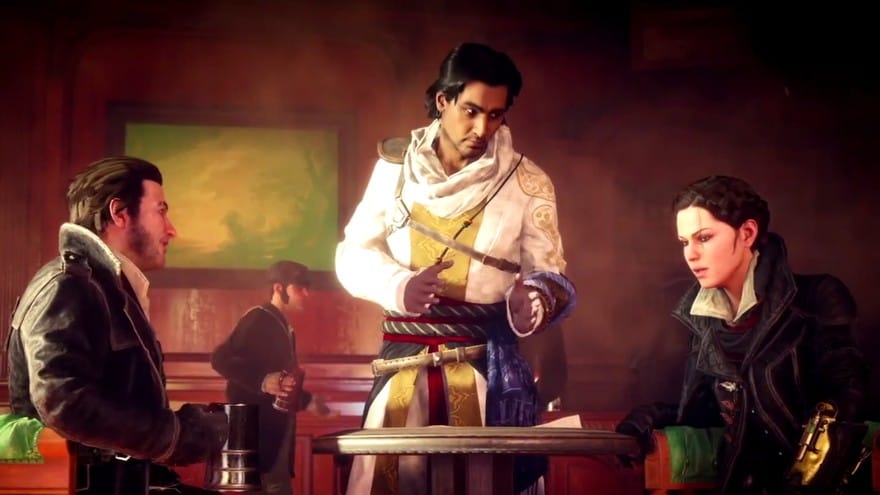The #Victorian frame of mind: A review of Assassin’s Creed Syndicate

“I was a Victorian in a past life,” the librarian told me, as she instructed me where to put my jacket, where to sit, how not to handle the book, how not to turn the pages. I was there to look at things written by people who actually were Victorians in a past life: things held and read and circulated by a 19th century public unaware that their era, more than others—perhaps more than any other—would eventually become a kind of fetish object. At the time, and this was only about a month ago, I didn’t quite understand what she meant when she said that, what she wanted me to take away from such a bizarre and apparently self-evident declaration. Then I played Assassin’s Creed: Syndicate.
///
There are a lot of uncharitable ways to describe Assassin’s Creed: Syndicate; perhaps the most uncharitable would be to call it an opportunistic collision of brands. On the one hand we have the brand of Assassin’s Creed itself, which couldn’t possibly be in poorer shape. Especially since last year’s Unity, a failure both technical and creative, it’s become a name synonymous with megabudget excess and lowest-common-denominator taste, a monolithic production machine churning out impossibly gorgeous dioramas only to give players the same stupid reasons to inhabit them. On the other hand, this entry brings Assassin’s Creed into contact with a brand that’s been going strong for over 150 years: that thing we like to call the “Victorian Era,” with its Jack the Rippers and steam-powered fainting couches and men with top hats and mutton chops fighting bare-chested under gas lamps.

The game feels like an arrival of some kind, as I’m sure it did to the developers in charge: an opportunity, finally, to merge the Assassin’s Creed aesthetic—which has never been that much more than a brand aesthetic to begin with: the silhouetted A, the eagle, the pointy hoodies, the stylized stabbing—with an aesthetic most players will recognize. They did it before with Black Flag, which was “AC + pirates”; this one is essentially and unapologetically “AC + steampunk.” What ends up being interesting about this synergistic combo is that it works about as well as Black Flag to produce a coherent experience—a harmonious melding of world-logic and videogame-logic, historical setting and “player-first” design. I went into it assuming that 1868 would be a bad year for your average Assassin’s Creed protagonist (or player): plenty of easily reloaded guns to counter close-quarter stabbing; a modern police force that might try to investigate things like mass murder; a consolidation of state power instead of lawless anarchy. As it turns out, what we like to think of as the “Victorian Era” suits the series extremely well—if only because it, too, as the developer’s creed likes to remind us, is a work of fiction “inspired by historical events” and developed by a team of millions.
One thing that makes Syndicate different from other games in the series is that it takes place in a single year, in all likelihood because no other year in the 19th century would’ve worked quite as well for AC’s patented Zemeckian combination of The Walk and Forrest Gump. 1868 means you get to climb Big Ben (which was completed in 1858) and chill with Dickens (who died in 1870); it means you run into Alexander Graham Bell—who, of course, gives you weapon upgrades—just before he invents the telephone, and Prime Minister Disraeli just before he loses power. Burgeoning interest in the occult gives the whole “pieces of Eden” thing a little more historical purchase; widespread industrialization gives the series a new kind of Templar that we probably should’ve been expecting: the Templar as arch-capitalist, hell-bent on domination through industry. His name is Crawford Starrick, and I don’t think you need to see a picture to imagine how waxed and curly his mustache is.
a harmonious melding of world-logic and videogame-logic
Opposing Mr. Starrick are the twins Jacob and Evie Frye, roguish 20-year-olds whose names are constantly rolling off the tongues of other characters, as if having a cute British-sounding three-syllable appellation could make up for a complete lack of identity. Make no mistake, these two are not Ezio, nor are they even Arno: there’s nothing to them at all except a strict opposition between Jacob’s brashness (he’s better at combat) and Evie’s caution (she’s better at stealth) that the game shoves down your throat every chance it gets. He’s dumb, she’s smart; he likes headbutting people, she likes stabbing them in the back; he wants to run a gang, she wants to explore ancient tombs. Thinkpieces will undoubtedly be written about the way her character, ostensibly there for the sake of an inclusiveness the series sorely lacked, just ends up solidifying a bunch of reductive gender binaries that are all the more exclusionary; Kill Screen’s own Gareth Damian Martin was on the money when he speculated that “she might be a bigger blow against women in games than if she was to be kept out entirely.” But I think the larger problem with Jacob and Evie is that they’re giant tools—by which I mean they’re almost entirely instrumental. They’re like a hammer and a screwdriver, defined purely by how suited they are to specific jobs—specific play styles—that both involve ceaseless killing. Nothing about them is resistant, reluctant, unsure. They have as little interiority and as much functionality as the hidden blades clamped to their forearms, or the grappling hook they use to move from the street to the roof in a single bound.
That feeling of instrumentality is everywhere in this game. Every single thing is bound to the logic of lock and key, gear and cog, the strict rational efficiency of having the right tool for the job. On the level of narrative structure, the game has eschewed the meandering plots of some of its predecessors in favor of something much closer to the first Assassin’s Creed: a straightforward pyramid of bad guys requiring one-by-one elimination. On the level of missions and sub-missions, the game has taken dramatic steps to take the “side” out of sidequests and fold every activity into a larger grid of systematic and economic “conquest.” Even on the level of minute-to-minute rhythm, what it’s like to actually play this game, a set of refinements mostly cribbed from the Arkham series contribute to a sense of flow that’s really about technological competence: landing “tool combos” (there is a combo counter now), finding the right grapple point, pouring experience points into perks. The end result is an experience that feels a lot more like other videogames—particularly Arkham and Metal Gear Solid V—than Assassin’s Creed did last year. It’s as though the series, in this entry obsessed with modernity, has itself been modernized, allowing a familiar open-world ethos of accumulation, technological self-improvement, and constant productivity (“DO this,” the game tells you, putting the action in all caps; “REACH here”; “KILL him”) to be the engine of narrative rather than a distraction from narrative.

In a way, this makes Syndicate the most generic Assassin’s Creed of all: it almost doesn’t matter that you’re clambering around an absurdly detailed, beautifully rendered version of Covent Garden or Waterloo Station; you are here to track, to eliminate, to escape, and ultimately to collect, with the focus of an automaton and the affectless efficiency of a postal worker. And yet, at the same time, this is also precisely what makes Syndicate pretty damn “Victorian,” beyond questions of historical accuracy or period detail. The game depicts clockwork labor at every turn, from alienated factory drudgery to the kind of child exploitation decried by Dickens and Elizabeth Barrett Browning. Everything is a machine of some kind, literally or metaphorically; as one ill-fated Templar puts it (because of course the Victorians, like Ubisoft, also loved their melodrama): “The mechanism we have built is going strong for a hundred years and will run a thousand more. It is the very city itself!” Eventually it becomes clear that the steampunk superheroism of the protagonists—your own contribution to this booming economy—is a kind of clockwork labor as well.
I think there’s something significant about that relationship between form and content, in part because it actually feels right. It felt kind of right, somewhat consonant with the ethos of an actual pirate, to be a completionist in Black Flag, systematically collecting every random chest and “Animus fragment” strewn across the Caribbean. It felt a lot weirder in revolutionary France. To be a completionist in Syndicate, however, is to be a player as well as a “player” in another sense—an economic actor in the world of commerce the game depicts. It’s right there in the title: you’re trying to build a “syndicate,” which sounds cooler than “Assassin’s Creed Conglomerate” but isn’t all that different. When it works it really works, even if it feels like “work”; it can be immensely satisfying to hop across the Thames and its speeding steam ships like an IRL Frogger, hustling toward the next job. It was Thomas Carlyle, after all, a Victorian Sage, who saw a kind of salutary escape from self in the ceaseless hooded labor (sound familiar?) of monks.
the most generic Assassin’s Creed of all
But to play this game in the way it wants to be played is also, unmistakably, to playact as a “Victorian” in the way we tend to understand the Victorians, projecting more than a little of ourselves: as a culture steeped in capitalism and technocracy; obsessed with objects and the problems they can solve; materialist to the core. The game ought to remind us all of that infamous and stratospherically smug Vox confessional about the couple living “as Victorians” in 2015:
Every morning I wind the mechanical clock in our parlor. Each day I write in my diary with an antique fountain pen that I fill with liquid ink using an eyedropper. My inkwell and the blotter I use to dry the ink on each page before I turn it are antiques from the 1890s; I buy my ink from a company founded in 1670. My sealing wax for personal letters comes from the same company, and my letter opener was made sometime in the late Victorian era from a taxidermied deer foot.
If you read Evie’s diary in the game, you will see, thankfully, that she isn’t talking about her taxidermied deer foot letter opener or her mechanical clock. She will, however, be describing her own insistent tick-tock movements: the mission, the MacGuffin, the need to have X in hand before Y slips away. Here’s what you won’t find: Introspection. Self-doubt.
///
Why are we so obsessed with the Victorians? Why do we want to be them? Or I guess the better question is: what do we want them to be? I have a feeling that the texture of the era changes with every generation, as new historical moments seize it—reinvent it—as a past incarnation, a prototype. In the essay “Late Victorians,” the writer Richard Rodriguez sees in AIDS-ravaged San Francisco a kind of trans-historical continuity: gay men living in Victorian houses who are themselves, essentially, Victorians of a kind. At the same time, he admits to living in a world of gilded mirrors where any such self-recognition is always going to be laced with artifice. His Victorian era is at least partly a product of elaborate, imaginative retconning, invented out of necessity.

I highly doubt that the “Victorian Era” that the librarian saw in herself looks the same as the era seen by Rodriguez, reenacted by the Vox couple, or brought to life in Syndicate. But the good thing about any Assassin’s Creed—if you’re morally or aesthetically opposed to the series, think of this as the one redeeming thing—is that it will always show us some sort of common-denominator cultural fantasy, generated by (or better yet, for) what Ubisoft perceives to be the average gamer, their Desmond Miles. And that can tell us a lot, even if we aren’t Desmond Miles. The metaphor of the Animus is genius, in a way, because it confirms the solipsism of the entire enterprise: from the beginning, these games have been about entering and clambering around historical stereotypes, rooted not so much in history but in our own flawed, doctored memory—our own DNA. These games are not about the past. They’re about presentism.
Syndicate deposits us in an 1868 that feels more than a little like 2015, a great machine of a city riveted together by materialism, technological fetishism, and the ceaseless rhythm of work. And in a way, we have no one to blame but the Victorians themselves. In literary historical terms, 1868 is a weirdly fitting year for the series because it sits almost precisely between the decline of “realism” as a dominant genre—those big, fat Victorian novels about class, marriage, social institutions, consciousness—and an explosion of the kinds of popular genres that we now call “genre fiction.” The detective novel. The adventure novel. Sci-fi. Victorian Gothic. An Assassin’s Creed game set in 1868 means, ironically, that the series has caught up to the formation of the genre ecosystem and aesthetic sensibility that informed it in the first place. The Moonstone, a “sensation novel” and arguably the first true detective novel, was published in 1868—a novel about an ancient object of tremendous power, dueling conspiracies to seize it, a murder in its wake. Dickens himself, as he appears in the game, is working on The Mystery of Edwin Drood. If Assassin’s Creed has always been about a sort of procedural professionalism, a mastery of the occult and the chaotic by honed instincts and the right tools, it’s because these genres are in its DNA: they are hymnbooks to a religion of technocratic expertise. And I think they’re in our DNA as well; at the very least, they’re somewhere at the core of our evolving yet static fantasy of the period and its “steampunk” character.
These games are not about the past
When I was a kid, I loved The Mysterious Island, an 1874 Jules Verne novel—the ultimate Victorian, even if he was French—about five American men of various professions who find themselves shipwrecked, only to completely and effortlessly solve their own problem through ingenuity, hard work, and scientific knowledge. I don’t think I was alone (or at least I hope I wasn’t alone) in hating The Martian for depicting exactly the same thing: one man’s technocratic and nearly affectless quest to “science the shit” out of his own predicament. Assassin’s Creed: Syndicate lets you science the shit out of murder in a city where people are sciencing the shit out of everything. There’s an undeniable appeal to that. But it’s an appeal worth looking in the face.
For more about Kill Screen’s ratings system and review policy, click here.



